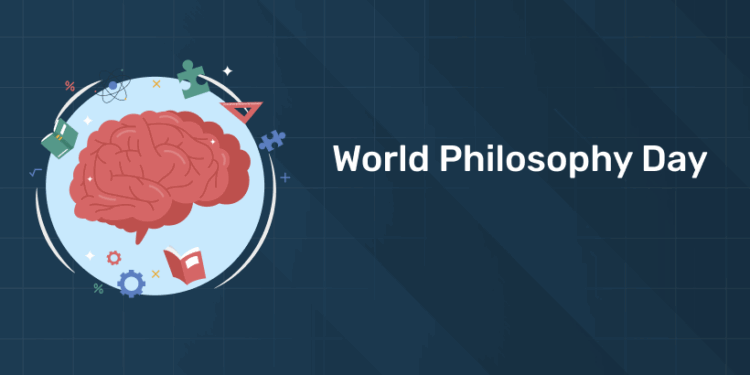Table of Contents
World Philosophy Day is celebrated every year on the third Thursday of November to honor the enduring value of human thought and reflection. Established by UNESCO in 2002, this day encourages people to explore the power of philosophy in understanding the world around them. It serves as a reminder that questioning, reasoning, and critical thinking are vital tools for building a more just and peaceful society. By celebrating this day, individuals and institutions worldwide come together to discuss fundamental human issues, ethics, and knowledge.
The observance promotes open dialogue among cultures and highlights philosophy’s role in promoting tolerance and mutual respect. It invites people of all ages to think deeply about the challenges of modern life and to seek wisdom through reason. Universities, schools, and organizations hold debates, workshops, and lectures that connect philosophy with real-world issues. Ultimately, World Philosophy Day inspires everyone to appreciate the importance of reflection, inquiry, and shared understanding in shaping a better future.
World Philosophy Day 2025 Date – November 20 (Third Thursday of November)
In this article readers can get a glimpse on
- History and Objective of World Philosophy Day
- World Philosophy Day Theme 2025
- World Philosophy Day Quiz
History and Objective of World Philosophy Day
1: Who was the first woman President of India?
World Philosophy Day was first introduced by UNESCO in 2002 and officially recognized in 2005. The idea was to promote the importance of philosophical thinking in addressing global challenges and fostering intellectual exchange. UNESCO believed that philosophy encourages dialogue between cultures and strengthens respect for human dignity. Since then, the day has been celebrated annually on the third Thursday of November, engaging educators, students, and thinkers worldwide. Each year, various countries organize lectures, conferences, and public discussions to explore philosophy’s role in society.
The main objective of World Philosophy Day is to encourage critical and independent thinking and promote understanding between individuals and communities. It aims to make philosophy accessible to everyone, not just scholars, by linking it to daily life and social concerns. The day also seeks to inspire reflection on moral, cultural, and political issues that shape humanity. Through education and open discussion, it helps nurture tolerance, peace, and shared responsibility for the world. Ultimately, its goal is to remind people that philosophy is a powerful tool for creating a fairer and wiser society.
Free UPSKILLING Courses!
Take your first step toward mastering in-demand skills, acing interviews, and securing top-tier jobs with Entri's free upskilling courses.
Start Learning!World Philosophy Day Theme 2025
World Philosophy Day is observed globally every year on the third Thursday of November. In 2025, this date falls on November 20th.
The Theme Has Not Yet Been Announced
As of now, the official global theme for World Philosophy Day 2025 has not been formally declared by UNESCO (the United Nations Educational, Scientific and Cultural Organization), which coordinates the observance.
UNESCO typically reserves the final announcement for closer to the date of the celebration. This allows the organization to select a theme that is most relevant to the pressing global issues and dialogue in the latter half of the year.
The General Focus of the Day
Regardless of the specific annual theme, the day remains dedicated to UNESCO’s core purpose for establishing the celebration:
- Promoting Critical and Independent Thought: Encouraging people everywhere to engage in free, reasoned, and informed thinking on the major challenges of our time.
- Fostering Global Dialogue: Providing a platform for philosophical reflection and the reasoned confrontation of opinions across diverse cultures and traditions, thereby contributing to a better understanding of the world.
- Highlighting Enduring Value: Underlining the importance of philosophy for the development of human thought, for every culture, and for every individual in addressing complex moral, social, and political issues.
For 2025, UNESCO is expected to place significant emphasis on the role of philosophy in addressing ethics, inequality, and the values that will shape future societies. This will involve critical reflection on economic justice, social divides, and the moral compass needed in an era of rapid technological and environmental change.
World Philosophy Day Previous Themes
World Philosophy Day is observed annually on the third Thursday of November. It was proclaimed by the United Nations Educational, Scientific and Cultural Organization (UNESCO) in 2005 to underscore the enduring value of philosophy for the development of human thought, for each culture, and for each individual.
Here are the themes and primary focus areas emphasized by UNESCO for World Philosophy Day:
- 2024 (November 21): Philosophical Reflection and Cultural Diversity
- Focus: Highlighting the various philosophical traditions across the globe and promoting intercultural dialogue and mutual understanding.
- 2023 (November 16): Philosophical Reflection in a Multipolar World
- Focus: Encouraging philosophical analysis of current global challenges, including technological change, social crises, and environmental destruction, from diverse perspectives.
- 2022 (November 17): The Human of the Future
- Focus: Examining how philosophical thought can help anticipate the human and ethical challenges posed by rapidly evolving fields like artificial intelligence, biotechnology, and space exploration.
- 2021 (November 18): Different Paths of Philosophy
- Focus: Acknowledging and celebrating the vast scope and variety of philosophical inquiry across different regions and historical periods.
- 2020 (November 19): The Importance of Philosophy in Times of Crisis
- Focus: Stressing the role of philosophy in helping societies cope with and reflect upon major global crises, such as the pandemic, and in rebuilding better.
- 2019 (November 21): Interactions Between Philosophy and Science
- Focus: Encouraging a deeper understanding of how philosophical questions underpin scientific knowledge and technological development.
- 2018 (November 15): The Relevance of Philosophy in the Contemporary World
- Focus: Promoting the idea that philosophy is essential for critical thinking, ethical reasoning, and navigating modern life’s challenges.
- 2017 (November 16): Philosophy and Peace
- Focus: Highlighting philosophy’s role as a tool for dialogue, tolerance, mutual respect, and fostering a culture of peace.
- 2020 (November 19): Social Transformation and Philosophy
- Focus: Emphasizing philosophy’s potential to drive positive social change, analyze injustices, and articulate visions for a more equitable future.
- 2015 (November 19): Tolerance and Dialogue
- Focus: Promoting tolerance and intercultural dialogue as core philosophical values necessary for coexistence.
- 2014 (November 20): Inclusion of Philosophy in Education
- Focus: Advocating for the integration of philosophical education at all levels to foster critical and independent thinking.
World Philosophy Day Quiz 2025
A) WHO
B) UNESCO
C) UNDP
3. In which year was World Philosophy Day first celebrated?
A) 2002
B) 2003
C) 2005
B) To encourage critical thinking and dialogue
C) To celebrate cultural festivals
5. Who is often called the father of Western philosophy?
A) Plato
B) Socrates
C) Aristotle
A) Metaphysics
B) Epistemology
C) Ethics
A) Immanuel Kant
B) René Descartes
C) John Locke
A) Aristotle
B) Socrates
C) Plato
A) Logic
B) Aesthetics
C) Ontology
Want More Engaging Questions?
Download our FREE PDF packed with insightful quiz questions to test your knowledge!
🔽 Click below to get your free copy now! 🔽
Free UPSKILLING Courses!
Take your first step toward mastering in-demand skills, acing interviews, and securing top-tier jobs with Entri's free upskilling courses.
Start Learning!World Philosophy Day Quiz 2025 PDF
World Philosophy Day reminds us that reflection and reasoning are essential for personal and social growth. By encouraging people to think critically and engage in open dialogue, it promotes a deeper understanding of human values and coexistence. The celebration connects people from diverse backgrounds through discussions about ethics, justice, and truth. It also highlights the importance of questioning assumptions and finding balanced solutions to global challenges through reasoned thought.
The observance continues to inspire individuals, educators, and leaders to value the power of ideas in shaping a better world. Through its annual events and educational initiatives, the day strengthens respect for diversity and intellectual freedom. It encourages the next generation to seek knowledge and understanding rather than division and conflict. In doing so, World Philosophy Day upholds the timeless relevance of philosophy as a guide to building a just, peaceful, and thoughtful society.
Free UPSKILLING Courses!
Take your first step toward mastering in-demand skills, acing interviews, and securing top-tier jobs with Entri's free upskilling courses.
Start Learning!Frequently Asked Questions
What is World Philosophy Day?
World Philosophy Day is an international observance that celebrates the value of philosophical reflection. It aims to encourage people to think critically about society, culture, and human progress. The day promotes open dialogue and understanding among people from different backgrounds. It highlights philosophy’s importance in shaping ethics, justice, and human dignity. UNESCO leads this celebration each year with global events and discussions.
When is World Philosophy Day celebrated?
World Philosophy Day is celebrated every year on the third Thursday of November. This date was chosen by UNESCO to allow for global participation. The day changes slightly each year but always falls in mid-November. It serves as a reminder of philosophy’s role in guiding moral and intellectual development. Educational institutions and organizations worldwide host lectures, debates, and public discussions on this day.
Why is World Philosophy Day important?
The day emphasizes the importance of critical thinking, logic, and dialogue in solving global issues. It encourages people to question assumptions and seek truth through reasoning. Philosophy helps individuals understand themselves and others better. It strengthens tolerance, mutual respect, and peaceful coexistence. Through this observance, UNESCO hopes to foster a culture of reflection and shared wisdom.
Who started World Philosophy Day?
UNESCO first celebrated World Philosophy Day in 2002. The event became an official UNESCO observance in 2005. The organization recognized that philosophical thinking is essential for human progress. It also helps in promoting education, democracy, and global peace. Since then, countries worldwide have joined in hosting educational and cultural events annually.
What are the main goals of World Philosophy Day?
The goals include promoting philosophical education and encouraging open discussion about social challenges. It aims to connect thinkers, educators, and students across cultures. The day inspires people to apply philosophical methods to everyday life. It highlights values like justice, equality, and human dignity. Overall, it seeks to make philosophy accessible and relevant to all.
How do countries celebrate World Philosophy Day?
Countries observe the day through lectures, debates, exhibitions, and public talks. Universities often host philosophy-themed conferences and workshops. Schools organize essay competitions or discussions on famous philosophers. Some nations also conduct media campaigns promoting philosophical education. These activities encourage people to engage in thoughtful dialogue and explore different perspectives.
What topics are discussed on World Philosophy Day?
Common topics include ethics, human rights, freedom, sustainability, and the meaning of life. Participants explore how philosophy relates to science, art, and politics. Many discussions also focus on cultural diversity and moral responsibility. The day often highlights the relevance of philosophy in modern society. It encourages people to question and reason for the betterment of humanity.
Who are some famous philosophers associated with this day?
Prominent figures like Socrates, Plato, Aristotle, Confucius, and Descartes are often mentioned. Their works form the foundation of philosophical study worldwide. Modern philosophers like Immanuel Kant and Jean-Paul Sartre also inspire many discussions. These thinkers have shaped how humanity understands knowledge, ethics, and existence. Their ideas remain central to the events held on this day.
How does philosophy benefit everyday life?
Philosophy teaches people to think clearly and reason logically. It helps in making fair and informed decisions. It also improves communication, empathy, and problem-solving skills. By reflecting on moral questions, individuals develop a deeper understanding of life. Thus, philosophy serves as a guide for ethical living and personal growth.
How can students participate in World Philosophy Day?
Students can join discussions, write essays, or attend philosophy seminars. Many schools and universities hold debates on moral or logical issues. They can also study the works of great philosophers or watch documentaries on philosophy. Participating helps students sharpen their critical thinking and reasoning skills. It also encourages curiosity about life’s deeper questions and global issues.













